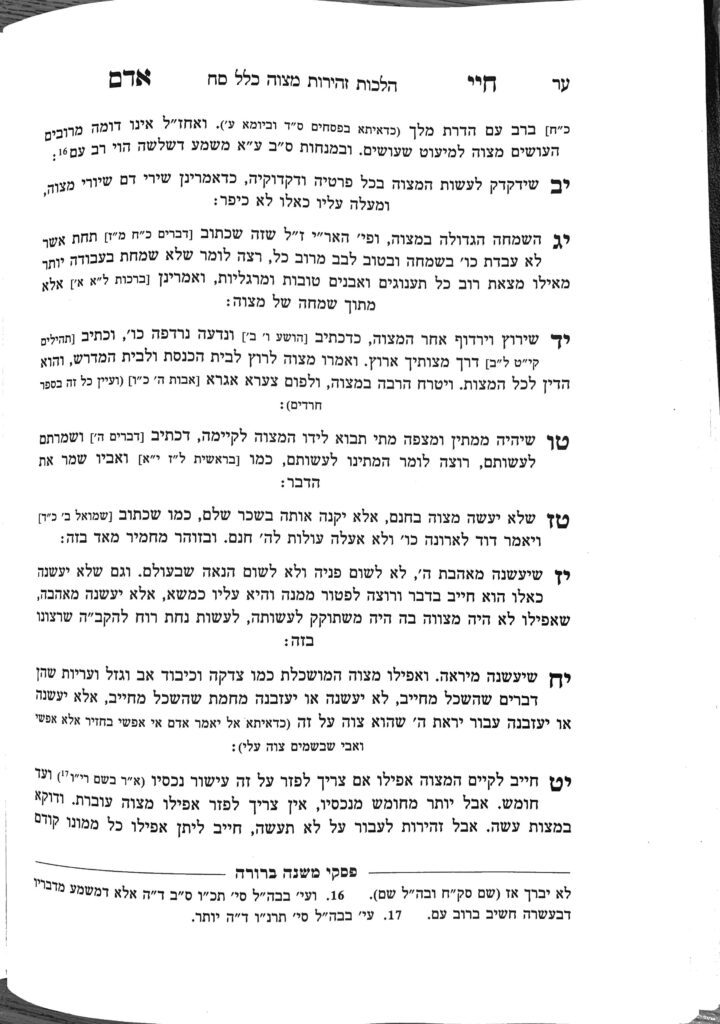We are beginning siman 15. The Chayei Adam discusses the concept of anticipating and waiting for the opportunity to perform a mitzvah. Included in this concept is the idea of a person trying to bring themselves to become chayav to perform a mitzvah.
The Chayei Adam writes that a person should anticipate the opportunities to do mitzvos, as the Torah says unshmartem la’asosam, “guard” to do them [the mitzvos]. The Chayei Adam understands that the word ushmartem comes to teach that a person should await the moment to perform a mitzvah. When Yosef shares his dreams with his brothers, Yaakov rebukes him, but the pasuk ends that Yaakov shamar es hadavar, he “guarded” the dreams, i.e., awaited for the moment they would come to fruition.
We also see regarding Shabbos that a person should anticipate and await for Shabbos to arrive. We also know that when Rebbi Akiva was put to death, he told his talmidim that his entire life he has been awaiting the opportunity to die al kiddush hashem.
If a person awaits the opportunity to perform mitzvos, a person will do what is necessary to bring themselves to a state of chiyuv. The Gemara in Menachos says that a person is not chayav in tzitzis unless one wears a four-cornered garment, so a person can avoid the mitzvah entirely by not wearing any four-cornered garments. However, the Gemara continues and says that at a moment of anger, Hashem will punish a person for not seeking out the opportunities to perform mitzvos. Although one cannot be punished, per se, at a moment of anger, Hashem will express anger, as it were, over a person not taking advantage of the opportunity to do mitzvos.
If a person is going to be in a situation where they anticipate the need to perform mitzvos, they need to plan accordingly. For example, if they are traveling, they should not assume they will find tefillin in their destination, but should bring along their own. Even if a person is planning a short trip, such as a back and forth trip from Silver Spring to Lakewod, and does not expect to need their tefillin, they should still anticipate the possible need and plan accordingly.
The Chovos Halevavos takes this concept a step further. If a person anticipates and waits to perform mitzvos, if they are zoche for a mitzvah to come their way, they get the sechar for it. If they are not zoche for a mitzvah to come their way, since they showed on their end that they wanted to perform the mitzvah, just that Hashem did not give them the opportunity, they will get the sechar as though they performed the mitzvah.
The Sefer Tosefes Chaim, a pirush on the Chayei Adam, adds that kabbalistically, one is supposed to fulfill all of the mitzvos at least once during their lifetime. Through this idea of the Chovos Halevavos, one can actually perform all of the mitzvos by anticipating and awaiting to perform every mitzvah.
Anticipating and awaiting to perform mitzvos is a tremendous hiddur, because expressing the desire to perform the mitzvah shows the importance and value of the mitzvah.
Summary
One should anticipate and await the opportunity to perform mitzvos, and seek out the opportunities to put themselves in a state of chiyuv to perform a mitzvah. Additionally, one should anticipate potential needs to perform mitzvos, and plan accordingly.



